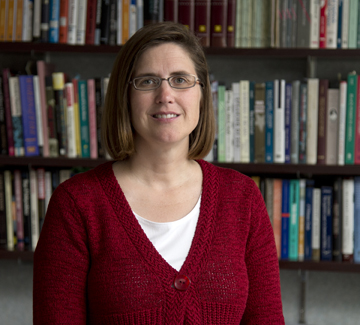Purdue Profiles: Rosie Clawson
October 8, 2012
 |
|
Rosie Clawson, professor
and head of political science. (Purdue University photo/Mark Simons) |
As a child, Rosie Clawson heard and watched her parents' passionate discussions of politics.
Now, as professor and head of political science at Purdue, Clawson leads her students in critical and analytical discussions about the most important political issues of our time. Clawson's work is especially pertinent this fall as the country prepares for the November general election.
What early memories do you have involving politics?
From a very young age, I can remember my parents and grandparents arguing about politics. Specifically, I remember my mother getting angry with Richard Nixon -- I remember her yelling at the TV while the news programs relayed details about the Watergate scandal. And then I remember my dad, who would make arguments in defense of the president. I think it's safe to say that I grew up in a time when political discussions really were at the forefront of the public's attention.
As a scholar, I became serious about politics while I was an undergraduate at DePauw University. I had a fantastic government professor who influenced me to study politics in graduate school, and I ended up getting a PhD in American politics with a minor concentration in political psychology.
What's it like being a political scientist during a presidential election year?
It's a lot of fun and it's really exciting. My colleagues and I are watching every election happening very closely -- we love to talk about all the nuances and to update each other on the latest news. We have a lot of good-spirited debates.
Because I just became the political science department head in July, I'm not teaching any classes right now. But I am involved with the Purdue chapter of Pi Sigma Alpha, the national political science honor society, which is holding an election-night party starting at 7 p.m. Nov. 6 in Hicks Undergraduate Library G980 C and D. It's a nonpartisan celebration of democracy that we hope students, faculty and community members will attend. We're also holding a debate-watching party at 8:30 p.m. Oct. 22 in Shreve Recreation Lounge.
As a scholar, what do you find interesting about this year's presidential election?
This time around, perhaps more so than in prior election years, the public is very polarized when it comes to politics. In previous election years, you'd often see candidates working hard to earn the undecided voters' favor. However, this year, I think most people have their minds made up. They already know which candidate they support. Because of this, we're seeing both candidates spend a lot of time appealing to their bases. They want to make sure that those who support them are actually going to get out and vote.
This year, there's also the wild card of pending voter ID laws. Many such laws are tied up in state court systems; we still might see some new rulings between now and Nov. 6. That could affect who votes in this election and who doesn't. In many places, advocates are scrambling to help people obtain the documentation they need to vote. For many observers, there's a real worry about disenfranchisement.
What are the subjects of your current research?
Right now, I'm looking at the ways climate change science is presented in political blogs, and whether the way it's described affects people's perception of the subject as a whole. It's been very interesting, because my co-authors and I are finding that when climate change is discussed as a global issue, the public seems to view it less alarmingly. But when climate change science is presented as something that will impact a local area in a specific way, then people tend to support policies that would curb it.
Overall, I've had some great opportunities to explore the country's political climate right now, both as a political scientist and as department head here at Purdue. When I do start teaching again next fall, I plan to use lots of examples from this election to help students understand how citizens reason about politics in a democratic society. In general, I'm excited to be the head of a department that contains so many wonderful scholars and political experts. It's a great time for me to be doing what I do.
Writer: Amanda Hamon, 49-61325, ahamon@purdue.edu

